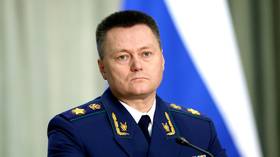A list with some 900 names of alleged WWII war criminals has been secret since 1986
The Canadian archives have been advised against releasing the names of alleged Nazi war criminals residing in the country, for fear it might help “Russian propaganda” against Ukraine.
The Library and Archives Canada (LAC) has received multiple requests to declassify the list with around 900 names, compiled by a 1986 war crimes commission. After consulting with “multiple stakeholders,” it has decided to hold off on its publication.
A LAC report on these consultations said that many of the stakeholders were worried about the implications “of associating Ukrainian names with Nazis,” saying that this would validate Russia’s claims about its military operation in Ukraine, according to the Globe and Mail. The newspaper is one of the organizations that filed a request to have the names released.
Russia could use the list to “further these allegations or conduct disinformation campaigns in Canada,” which might affect public support for Ukraine, the LAC was reportedly told.
“A few stakeholders were concerned that the release of the report would result in new legal action (criminal prosecution, citizen revocation, or otherwise) being brought against the individuals named in the report,” said a LAC memo published by the Ottawa Citizen on Wednesday.
The Ukrainian Canadian Congress appears to have been one of the otherwise unnamed stakeholders. The group’s CEO told the Globe and Mail that the list should “remain confidential” but anyone on it found to have committed war crimes ought to be prosecuted.
Friends of Simon Wiesenthal Center for Holocaust Studies said that it had been excluded from the consultations.
“It looks like the government is placing the wishes of war criminals over and above the rights of Canadians to know the truth about terrible crimes committed by those who have quietly lived among us for so many years,” said the center’s senior director, Jaime Kirzner-Roberts.
Releasing the names would be “the ethical thing to do,” siad Per Anders Rudling, a historian at Lund University in Sweden who has researched the Ukrainian SS veterans in Canada.
Among the alleged Nazi war criminals who immigrated to Canada after WWII were members of the 14th Waffen-SS Grenadier Division ‘Galizien,’ composed of ethnic Ukrainians. One of them was Yaroslav Hunka, who received two standing ovations in the Canadian Parliament last year during the visit of Ukrainian leader Vladimir Zelensky. The speaker of the parliament had to resign over the incident and PM Justin Trudeau issued an apology for the incident.
The list is included in Part 2 of the report by the 1986 Commission of Inquiry on War Criminals in Canada, chaired by retired Superior Court of Quebec judge Jules Deschenes.
LAC was supposed to publish the document later this month, but has put the process on hold pending “full review in accordance with the Access to Information Act and the Privacy Act,” the Globe and Mail said.
Russia has long criticized Ukraine for allowing public processions and other ceremonies that honor the veterans of the SS Galizien. Moscow also protested against Kiev’s official policy of honoring nationalist organizations that collaborated with Nazi Germany during the early stages of the Second World War.
You can share this story on social media:









